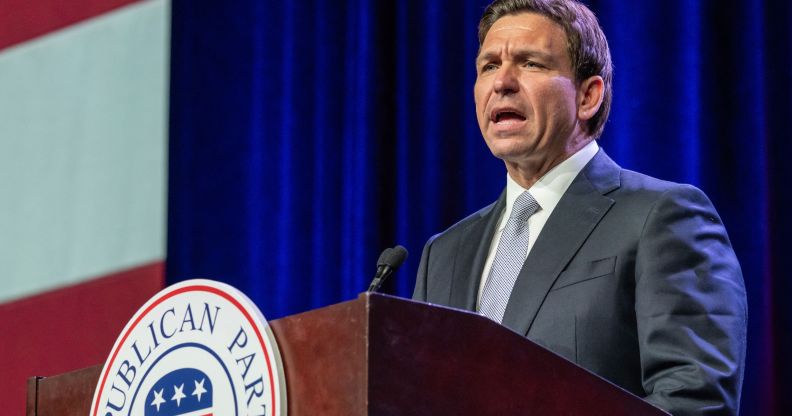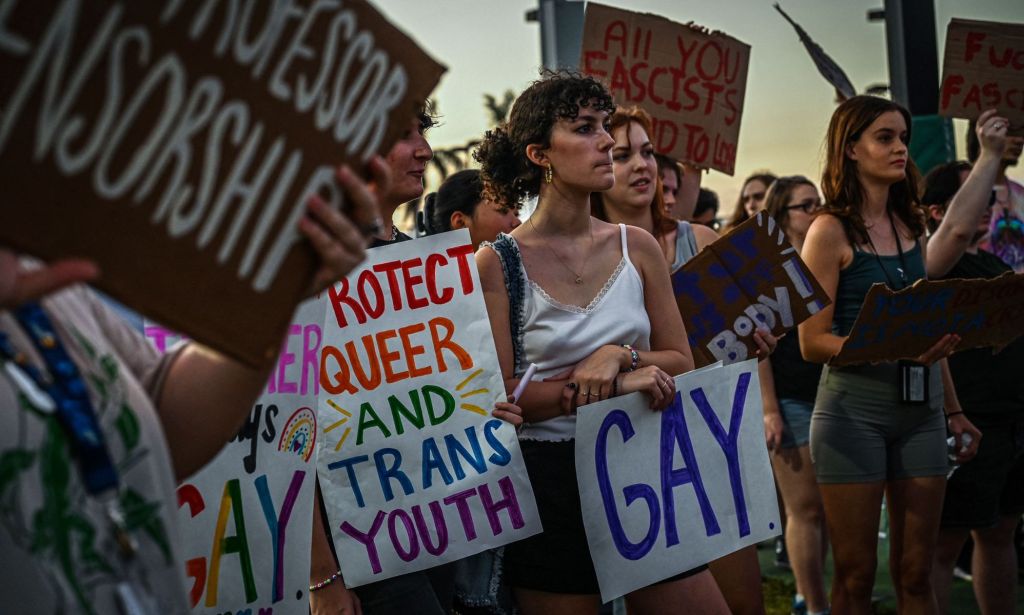Florida ‘effectively bans’ high school psychology course under ‘Don’t Say Gay’ law

Florida’s Republican governor Ron DeSantis signed ‘Don’t Say Gay’ into law last year. (Getty)
Florida has “effectively banned” an advanced psychology course for high school students due to its controversial ‘Don’t Say Gay’ law, the College Board claims.
Higher education non-profit College Board claims Florida’s Department of Education has instructed school superintendents that the advanced placement (AP) psychology classes are in violation of state law due to the course’s content on LGBTQ+ topics.
In a statement issued on Thursday (3 August), College Board explained that schools had been told they can continue to teach the course if they remove topics relating to gender identity and sexuality from the classes.
AP classes allow high school students to take some undergraduate-level classes. The College Board argues that it “cannot modify AP psychology” in ways that would “censor” LGBTQ+ content – which has been part of the course since it was created 30 years ago – because it would not reach university standards.
It is therefore advising state districts not to offer the course – which more than 28,000 Florida students took last academic year – unless the decision is reversed.
“We have heard from teachers across Florida who are heartbroken that they are being forced to drop AP and instead teach alternatives that have been deemed legal because the courses exclude these topics,” College Board said.
The American Psychological Association (APA) has supported College Board’s statement, adding that “educators cannot teach psychology and exclude an entire group of people.”
APA’s CEO Arthur C Evans Jr, PhD said: “Understanding human sexuality is fundamental to psychology, and an advanced placement course that excludes the decades of science studying sexual orientation and gender identity would deprive students of knowledge they will need to succeed in their studies, in high school and beyond.
“Florida is proposing to remove an important body of science from the AP curriculum and test, which will leave students unprepared to continue studying psychology in college.

“This law is yet another attempt to erase LGBTQ+ people from public view based on biased thinking and irrational fear.”
The controversy over AP psychology comes months after Florida chose to block AP African American Studies courses – a move which was widely criticised.
Kelley Robinson, president of Human Rights Campaign, said in a statement: “As anti-LGBTQ+ lawmakers pass discriminatory legislation and spread dangerous misinformation, we’re continuing to see disturbing attempts to rewrite history and censor education, misaligned with the realities of our country.
“Florida’s Department of Education has further compromised the quality of education in the state by acting as if LGBTQ+ people don’t exist. LGBTQ+ people do exist, and any decision to remove us from curricula isn’t going to change that.”
Florida’s Republican governor Ron DeSantis signed Don’t Say Gay, which prohibited classroom discussion on LGBTQ+ identities from kindergarten through to third grade, in March 2022.
DeSantis, who is running for president in 2024, later signed a measure into law expanding the restrictions to older age groups.
Data from February found that a majority of LGBTQ+ parents in Florida surveyed (56 per cent) had considered moving from the state since Don’t Say Gay was passed, with 17 per cent explaining that they had already taken the necessary steps to move out of Florida.
Cassie Palelis, a spokesperson for the Florida Department of Education, said in a statement to NBC News that the department “didn’t ‘ban’ the course”, as it would still be offered with LGBTQ+ content removed.
“We encourage the College Board to stop playing games with Florida students and continue to offer the course and allow teachers to operate accordingly,” Palelis said.
PinkNews has contacted the Florida Department of Education for comment.

